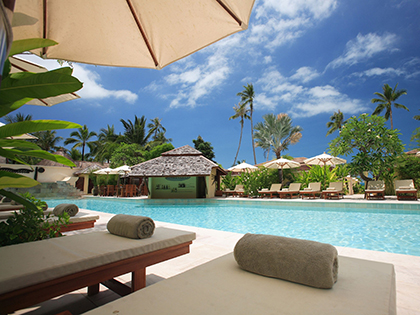Rehab Retreat for Depression and Anxiety
Rediscover Peace and Wellness in Bali
Depression can feel overwhelming, and it may be hard to gather the strength to seek help. You may find it easier to look at mental health retreat as a kind of well-deserved personal holiday for your body and mind. A depression retreat in Bali can provide just that service, letting you breathe, heal, and set your life back on course.
The truth is:
We all experience sadness now and then, but feeling sad or unmotivated most of the time may be a sign of depression. Indeed, depression is commonly experienced as a continuous feeling of despair, and a lack of control over your ability to recover. Fighting depression can be exhausting, particularly as it is often accompanied by a rise in anxiety as well.
But here’s the good news:
Depression retreats in Bali offer integrative therapies within a holistic approach, so your recovery from depression can be a more relaxed one. These retreats focus on integrating various therapeutic modalities, such as psychological therapy sessions, mindfulness practices, yoga, meditation, and alternative healing techniques.
The aim is to provide individuals with a comprehensive toolkit to manage depression and cultivate inner peace. Participants have the chance to disconnect from the pressures of daily life and immerse themselves in a supportive community of like-minded individuals.
What is depression?
Often described as ‘living in a dark hole’, depression may cause you to feel empty for almost no concrete reason. You may even feel short bursts of happiness, but they are often accompanied by intense feelings of helplessness and hopelessness. The effect is that your day-to-day life no longer brings the same joy for things that it once did. Many who suffer from depression wrestle with an unwinnable inner critic, caught in a spiral of ruminative thoughts and episodes of anxiety. This experience is more widespread than many people realise; today, about 264 million people suffer from depression worldwide.¹
When antidepressants don’t work
Although antidepressants have been proven to help with depression, they treat the illness chemically whilst ignoring the underlying causes. In order to truly move forward, these root causes must be addressed. As the stigma of mental illness fades, retreats have become an increasingly popular intervention for depression. Attending one under the guidance of professionals will allow you to explore yourself more deeply. The experience will help you to understand the causes of your condition, your triggers, and most importantly, how to tackle them.
The holistic approaches to treating depression
As opposed to medicinal treatments, the holistic approach looks beyond chemical imbalances alone to encourage personal growth toward happiness and wellness. This set of methods views the person as a whole, focussing on their physical, emotional, social, and spiritual well-being. By integrating various therapeutic modalities, individuals are provided with a toolkit to manage their depression and cultivate inner peace.
One of the key benefits of holistic approaches is the emphasis on individualised care. Each person’s experience with depression is unique, and what works for one may not work for another. Holistic retreats offer personalised programmes tailored to the specific needs and goals of each participant. This individualised approach ensures that individuals receive the support and guidance necessary to address their unique challenges.
Why Australians choose a specialist retreat for depression in Bali
A retreat away from home can be a great way to free yourself from concern and approach treatment with a clear and relaxed mind. Depression retreats in Bali are widely known and respected for providing effective treatment in an ideal setting.
A significant part of the treatment comes from the location itself; from stunning beaches, lush landscapes, charming hospitality, and the island’s tropical climate, Bali provides the perfect setting for clients looking to fight depression and anxiety by reconnecting with nature, beauty, and warmth.
As opposed to the plain environment at most psychiatric hospitals and clinics in Australia, retreats in Bali provide comprehensive programmes in the form of relaxed ‘healing holidays’. These are exciting for your senses, customised to meet your specific needs, and adaptive to changes in your condition.

In addition to treating mood disorders which include major depression, bipolar disorder, dysthymia, and substance-induced mood disorder, treatment is also available for other mental health problems that may contribute to, or result from, depressive symptoms.² Anxiety, eating disorders, and addictions all fall into this category. Other areas of focus may include treatment for obsessive-compulsive disorder, body dysmorphic disorder, personality disorders, relationship struggles, trauma, anger, and grief.
Retreats programmes in Bali can be designed specifically for individuals, families, and couples, as well as small groups of no more than 10.
Activities and therapies offered in depression retreats
Depression retreats in Bali offer a wide range of activities and therapies to support individuals on their healing journey. These activities are carefully curated to provide participants with a holistic experience that addresses their physical, mental, and emotional well-being. Although modalities may differ from one centre to another, the following modalities can be expected:

Alternative therapies commonly refer to varieties of yoga and massage treatments. High-end retreats, however, may also include other activities such as hypnotherapy, energy healing, and acupuncture. All of these treatments can be effective ways to clear your head and relieve stress, letting you deal more effectively with debilitating issues.
The island offers a variety of adrenaline-pumping activities such as cliff jumping, snorkelling, mountain climbing, and other cultural activities that can help you fend off feelings of isolation. In addition to these recreational activities, Bali retreats can include several types of programmes – for instance, nutritional programmes may focus on diet and exercise, helping you maintain a self-care routine for better physical health.
Choose a Retreat That Meets Your Needs
How long is depression retreat?
How much do depression rehabs in Bali cost?
Rehab retreats in Bali are priced according to length, location, and the quality of facilities. Generally, residential depression rehab in Bali will cost anywhere from AU$2,000-8,000 per week. Additional programmes may be subject to extra charges.
Are retreats effective?
In recent years, increasing numbers of people have chosen wellness retreats to address their mental health problems.
Research confirms that:
Wellness retreats are indeed effective in boosting people’s mental health in several respects. A study assessing the health outcome of retreat experiences found substantial improvements in a variety of measurements. These improvements were maintained well after the end of treatment, suggesting that such an approach provides lasting benefit.³
Bali - a retreat destination for overcoming depression
The advantages of treating yourself to a depression retreat in Bali are numerous and varied. Retreats offer intensive treatment in a short timeframe, letting you receive in 7-14 days what could otherwise take 3-6 months of weekly therapy.
It gets better:
Each retreat offers a setting conducive to establishing healthier daily routines. With custom-made nutrition programmes, a variety of recreational activities, and schedule that includes regular counselling, the experience is designed to give you a new mindset and a fresh path forward.
Similarly, a luxury holiday-style rehabilitation is a great way to break away from the everyday stressors that you would otherwise encounter. Most depression retreat programmes offer follow-up sessions via phone or in-person, as a way of keeping track of your mental health even after your primary treatment has ended.
By participating in a wellness programme, you are guaranteed an opportunity to gain perspective and learn coping strategies that can deliver real breakthroughs and bring long-term benefits.

Benefits of depression retreats in Bali
- Private luxury accommodation with ensuite
- Intensive one-on-one treatment within a short time frame
- A range of recreational therapies including meditation and yoga sessions
- Nutritious daily meals
- Access to on-site facilities, e.g. pool, gardens, gym
- Structured environment conducive to healthy mindsets and routines
- Therapy programme is entirely catered to your needs
- Complementary airport transfers
Choosing the right retreat for your needs
With a multitude of retreats to choose from, finding the right one can be overwhelming. It is essential to consider your specific needs and goals when selecting a retreat. Some retreats focus more on physical activities such as yoga and hiking, while others place a greater emphasis on psychological therapy and mindfulness practices.
Researching the retreat’s philosophy, approach, and testimonials from previous participants can help you determine if it aligns with your needs and expectations. It is also important to consider the retreat’s location, accommodation, and the qualifications and experience of the facilitators. Taking the time to find the retreat that resonates with you will ensure that you have a meaningful and transformative experience.
For detailed advice on recovering from depression and other mental health issues, feel free to get in touch with us personally – or browse our collection of mental health retreats in Bali. We can help you select a suitable retreat programme for you or your loved ones.
- World Health Organization. (2020, January 30). Depression. World Health Organization. https://www.who.int/news-room/fact-sheets/detail/depression.
Cohen, M. M., Elliott, F., Oates, L., Schembri, A., & Mantri, N. (2017). Do Wellness Tourists Get Well? An Observational Study of Multiple Dimensions of Health and Well-Being After a Week-Long Retreat. Journal of alternative and complementary medicine (New York, N.Y.), 23(2), 140–148. https://doi.org/10.1089/acm.2016.0268
Leading Institutions We Abide By

